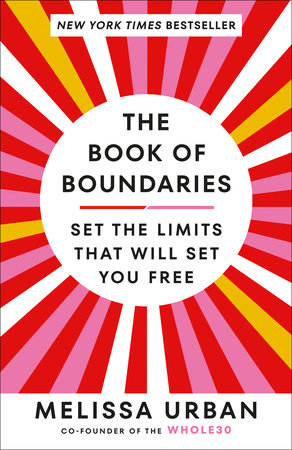Excerpt
The Book of Boundaries
Chapter 1
A Crash Course on BoundariesBoundaries aren’t meanA woman named Nancy recently sent me a message on social media: “I take a walk by myself every morning, for my own mental health. Lately, my elderly neighbor has been inviting herself along, waiting for me to come outside, then joining me. She’s very nice, and it’s clear she likes the company, but this is the only alone time I get in my day. How can I say no to her without feeling mean?”
I get where Nancy is coming from. We (especially women) are often told that it’s selfish to put our own feelings and needs first. This is a common objection to boundaries: that setting them feels cold or punitive, like you’re building a wall between people and creating division. But remember, boundaries aren’t walls, they’re
fences. And good fences make for good neighbors.
Boundaries allow those who care about us to support us in the way we want to be supported. They provide a clear line between what we find helpful and harmful, so people don’t have to try to read our minds. They let us engage in relationships fully and openly, knowing we’ve clearly expressed our limits and made it easier for others to respect our needs. In fact, the best way to preserve a relationship often includes setting boundaries within it.
Nancy liked her neighbor and wanted to have a good relationship with her. If this neighbor kept crashing her morning walks, Nancy was going to become resentful, then angry, and perhaps even lash out one morning out of sheer frustration. Setting a boundary here would be an act of
kindness, allowing Nancy to care for her neighbor without putting her own needs on hold to do so.
I asked Nancy how many mornings she might be willing to spend in her neighbor’s company—from zero days to every morning of the week. She replied that she’d enjoy walking with her once a week on the weekend, so I sent Nancy a script for her to use the following day: “Good morning! Hey, I’m going to start walking by myself again during the week. This is the only alone time I get, and I really need it for my mental health. Would you like to join me on Saturday morning when things are more relaxed?” Nancy loved the suggestion. This allowed them both to get what they wanted—some quality time when they’re both feeling relaxed, and the alone time Nancy needed to recharge during the busy work week.
You’re not being mean when you set boundaries, you’re being
kind—to yourself and your relationships. But that doesn’t mean they’re not uncomfortable. Any conflict can be uncomfortable—if your burger comes out rare instead of medium-well, I’m betting at least some of you would just eat it rather than speak up. Setting boundaries can be uncomfortable because when we set a boundary, we’re expressing a limit that hasn’t yet been established (while perhaps pointing out someone else’s inconsiderate behavior), and asking if the other person is willing to make an adjustment for the good of the relationship.
If that just made you throw up in your mouth a little bit, you’re not alone. My research shows that the main reason people don’t set boundaries where they need them is that it’s so damn
uncomfortable. I won’t try to pretend otherwise—I feel it, too. It’s not always easy for me to say no to an esteemed work colleague, to ask my husband for alone time, or to tell my parents, “I won’t discuss this with you further.” Speaking up in the moment, advocating for yourself, and asking for what you need
is uncomfortable. But what’s both uncomfortable
and damaging is reaffirming the story that someone else’s feelings are more important or worthy than your own—which is what you do every time you swallow your healthy boundary in an effort to keep the peace.
The truth is, when someone oversteps your limit,
there is no comfortable solution. But one path is paved with short-term discomfort that leads to major long-term improvements in your health and happiness . . . and the other path is just an endless circle that leaves you feeling unworthy, anxious, angry, and resentful.
One of those sucks way more. And for those of you stuck on the sucky path, I have to ask . . . how’s that been working out for you, really? How has it felt to honor everyone’s needs but your own? To sell yourself out to keep other people happy? To take on too much whenever people demand it? To spend all that energy on people, conversations, or behaviors that never give you anything back? Said with so much love: I bet the reason you’re reading this book is that it’s not going very well at all. What I’m giving you here is a better way—one that leads to more fulfilling relationships, improved self-confidence, better health, and more time and energy for the things that are important to you. It may be uncomfortable, but I guarantee it will be worth it.
Boundaries are how we care, stay supportive, and give to those we love without sacrificing our own health and happiness in the process.




